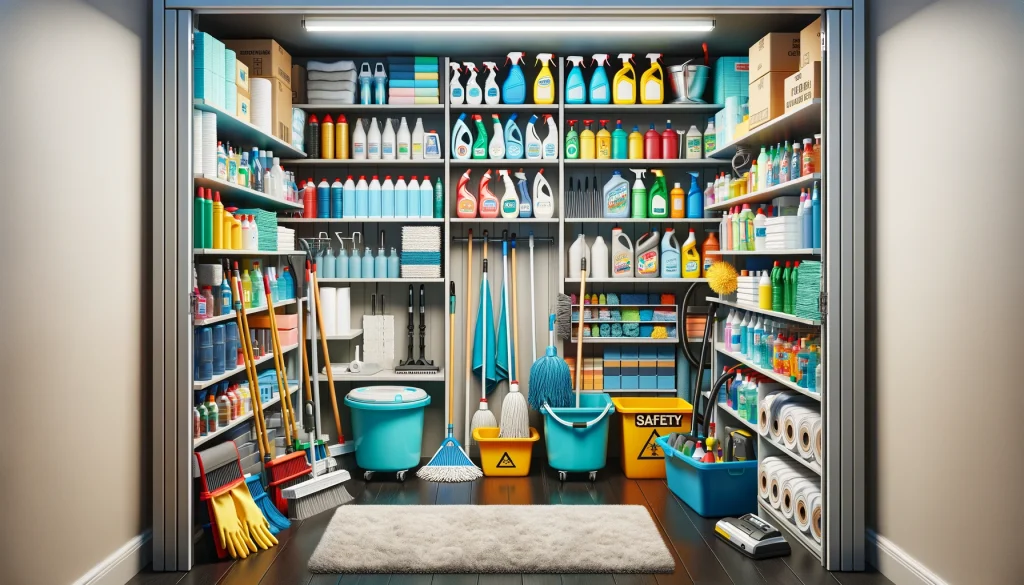Maintaining a clean and healthy environment is essential for any business or facility. Whether it’s an office, school, hospital, or industrial facility, the importance of cleanliness cannot be overstated. Janitorial supplies play a crucial role in ensuring that spaces are not only aesthetically pleasing but also safe and hygienic for everyone. In this comprehensive guide, we will explore the different types of janitorial supplies, their uses, and tips for selecting the right products for your needs.
Why Janitorial Supplies Matter
A clean environment offers numerous benefits:
- Health and Safety: Regular cleaning reduces the spread of germs and illnesses.
- Professional Appearance: Clean spaces create a positive impression on clients and visitors.
- Longevity of Facilities: Proper maintenance extends the life of floors, carpets, and other surfaces.
- Employee Morale: A clean workspace can boost employee morale and productivity.
Types of Janitorial Supplies
- Cleaning Chemicals
- Disinfectants: Used to kill bacteria, viruses, and fungi on surfaces. Essential for high-touch areas like doorknobs, light switches, and restroom fixtures.
- Detergents: Used for general cleaning tasks such as washing floors, walls, and other surfaces.
- Glass Cleaners: Specially formulated to clean windows and mirrors without leaving streaks.
- Degreasers: Used to remove grease and oil from surfaces, particularly in kitchens and industrial settings.
- Cleaning Tools and Equipment
- Mops and Buckets: Essential for floor cleaning. Microfiber mops are popular for their efficiency and ability to trap dirt.
- Brooms and Dustpans: Used for sweeping floors. Different types of brooms are available for indoor and outdoor use.
- Vacuum Cleaners: Crucial for carpeted areas. Choose between upright, canister, and handheld models based on your needs.
- Scrub Brushes: Used for scrubbing surfaces like tile, grout, and outdoor areas.
- Paper Products
- Toilet Paper: A basic necessity for restrooms. Available in various qualities and sizes.
- Paper Towels: Used for hand drying and cleaning spills. Roll and folded varieties are available.
- Facial Tissues: Commonly used in offices and healthcare settings.
- Trash and Waste Management
- Trash Bags: Available in different sizes and strengths for various types of waste.
- Recycling Bins: Encourages recycling and helps in waste segregation.
- Trash Cans: Necessary for collecting waste. Choose from indoor and outdoor varieties, with or without lids.
- Restroom Supplies
- Hand Soap: Available in liquid, foam, and powder forms. Ensure dispensers are easy to use and regularly refilled.
- Air Fresheners: Help maintain a pleasant scent in restrooms and other areas.
- Toilet Seat Covers: Provide an extra layer of hygiene in restrooms.
- Safety Supplies
- Gloves: Protect hands from chemicals and germs. Disposable and reusable options are available.
- Safety Signs: Indicate wet floors, cleaning in progress, and other hazards to prevent accidents.
- Protective Clothing: Includes items like aprons and shoe covers to protect clothing and reduce the spread of contaminants.
Selecting the Right Janitorial Supplies
Choosing the right janitorial supplies depends on several factors:
- Type of Facility: Different facilities have varying cleaning needs. For example, hospitals require stringent disinfection protocols, while offices might focus more on maintaining a pleasant environment.
- Surface Types: The types of surfaces in your facility will determine the cleaning tools and chemicals needed. Carpets, tiles, hardwood floors, and upholstery all require specific care.
- Frequency of Cleaning: High-traffic areas need more frequent cleaning and therefore more durable supplies.
- Budget: Balance between quality and cost. Investing in high-quality supplies can save money in the long run by reducing replacement frequency and improving cleaning efficiency.
- Environmental Impact: Consider eco-friendly options that reduce environmental impact. Look for products with green certifications.
Tips for Effective Janitorial Management
- Training: Ensure that cleaning staff are well-trained in using supplies and equipment. Proper training can improve efficiency and safety.
- Inventory Management: Keep track of supplies to avoid running out of essential items. Implement an inventory management system to monitor usage and reorder as needed.
- Regular Maintenance: Maintain cleaning equipment regularly to ensure it remains in good working condition. This includes cleaning vacuum filters, checking mop heads, and servicing machinery.
- Quality Control: Regularly inspect the cleanliness of the facility and provide feedback to cleaning staff. Implement a quality control checklist to ensure all areas are properly cleaned.
- Sustainability Practices: Adopt sustainable cleaning practices, such as using microfiber cloths, eco-friendly chemicals, and energy-efficient equipment.
Conclusion
Investing in the right janitorial supplies and practices is essential for maintaining a clean, healthy, and welcoming environment. By understanding the different types of supplies available and their uses, you can make informed decisions that benefit your facility, employees, and visitors. Remember that cleanliness is not just about appearance; it plays a critical role in health, safety, and overall well-being.
This guide aims to provide a comprehensive overview of janitorial supplies and their importance. Whether you are a facility manager, business owner, or cleaning professional, having the right tools and knowledge is key to achieving and maintaining high standards of cleanliness.


